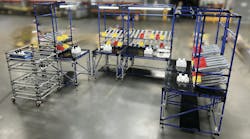Johnson Controls' GLAS smart thermostat has been recognized for design and engineering excellence with a prestigious CES Innovation Award Honoree designation from the Consumer Technology Association (CTA).
Products are judged by a respected panel of independent industrial designers, engineers and members of the trade media. Entries are evaluated on their engineering, aesthetic and design qualities, user value, features and how the design and innovation of the product compares to others in the marketplace. The recognition honors outstanding consumer electronics products across 28 categories.
Launching in early 2018, GLAS is a simple-to-use, yet powerful smart thermostat. Designed by the same company that invented the room thermostat, GLAS leverages more than 135 years of insights in building control systems to create a thermostat with an efficient and modern perspective.
It is the first smart thermostat of its kind to utilize a translucent OLED touchscreen display to control its functions. Users simply touch the screen to change the temperature, monitor indoor and outdoor air quality, track energy savings or perform other functions. Alternately, GLAS can be controlled by mobile app or by voice, thanks to Microsoft's voice-enabled digital assistant, Cortana. When it's not in use, the screen seamlessly blends in with a home or building's environment.
Thermostat reports indoor and outdoor air quality to help you maintain a healthy home
GLAS tracks and assesses multiple aspects of air quality to ensure that occupants are consistently comfortable, knowing that a healthy home starts with the air its residents breathe. In addition to temperature, GLAS reports humidity, total volatile organic compounds (tVOC) and equivalent carbon dioxide (eCO2) inside a home or building. When it is internet-connected, GLAS also monitors tree, grass and ragweed pollen count; ultraviolet (UV) index; and air quality index (AQI)—including carbon monoxide, sulfur dioxide, nitrogen dioxide and ozone levels. When air quality falls below moderate levels, GLAS can intelligently operate a fan or ventilation equipment. These insights arm allergy and asthma sufferers with information they need to live more comfortably.
GLAS adapts to a user's schedule to intuitively and attentively maintain a comfortable space while it saves energy. Its automation programming is easy to understand and takes the hassle out of setting individual preferences. After a user sets preferred temperatures for Home, Away and Sleeping, GLAS' smart logic helps save energy by detecting when a home is occupied or empty, and automatically adjusts its settings accordingly.
Microsoft's Cortana and GLAS' mobile apps allow easy control of thermostat features
With Cortana, Microsoft's personal digital assistant, GLAS makes communicating with a user's home simple and interactive. Users can easily adjust, refine and redefine their space with simple voice control. Cortana allows users to check and audibly receive indoor and outdoor temperatures, set increases or decreases in thermostat temperature and obtain the current weather forecast by using their voice, among other skills.
Additionally, GLAS provides an intuitive, engaging experience whether interacting with the device itself or the GLAS app on mobile, tablet or web browser. Using mobile apps for iOS and Android operating systems, users can seamlessly access GLAS controls and statistics with the same interface from the device, eliminating any learning curve.
Temperature automation can save energy costs for users
GLAS is designed to create a consistently comfortable space and does so by leveraging Johnson Controls' deep experience in automation and proprietary temperature control algorithms. GLAS provides around-the-clock reporting of equipment run-time as well as a related seven-day trailing report of a user's energy savings. GLAS also provides seven-day scheduling that can be customized according to user preferences. Comfort settings include pre-start heating/cooling and fan and ventilation options based on temperature and air quality.





